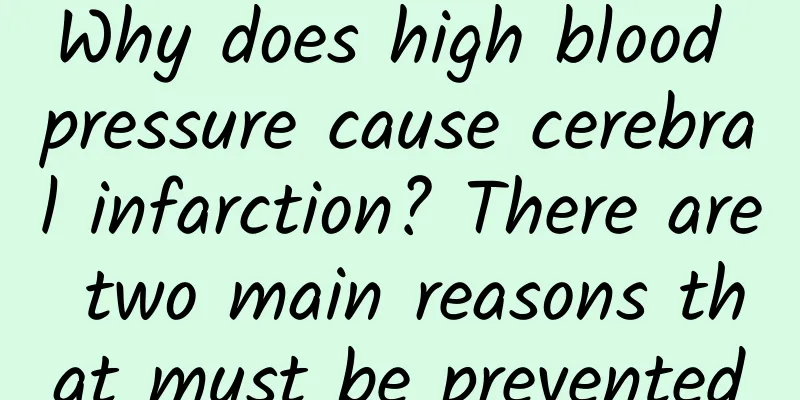Why does high blood pressure cause cerebral infarction? There are two main reasons that must be prevented

|
A friend was hospitalized for a mild cerebral infarction. He told Huazi that he had always been in good health, except for a slightly high blood pressure, and he couldn't understand why he had a cerebral infarction. Huazi told him that the reason for his cerebral infarction was "slightly high blood pressure." The two main risk factors for cerebral infarction are atherosclerosis and atrial fibrillation, both of which are related to hypertension. 1. Causes of cerebral infarction There are two main causes of cerebral infarction. One reason is atherosclerosis. The structure of atherosclerotic plaques in arteries is that the surface of the lipid core is covered with a layer of fibrous cap. Some plaques have a large lipid core and a thin fibrous cap. These plaques are "thin skin and large filling" plaques and are unstable. They may rupture due to factors such as arterial spasm, contraction, blood pressure fluctuations, and blood flow erosion. The surface of the ruptured plaque will activate platelets to aggregate. The aggregated platelets will release coagulation factors and activate fibrin to form a "net", entrapping many blood cells to form a thrombus, which will directly block the blood vessels or fall off to form an embolus, blocking the small blood vessels at the distal end. Another reason is atrial fibrillation, which refers to the high-frequency, irregular tremor of the left atrium, which loses its normal pumping function. However, the ventricular function is normal, so it will not affect blood circulation. However, during atrial fibrillation, the blood flow rate in the atrium will slow down, forming turbulence in the atrial appendage, and the blood will easily coagulate, forming a thrombus attached to the atrial wall, which is called a wall thrombus. Under the flushing of blood flow, the wall thrombus may break off and become an embolus, which flows with the blood. When it reaches the brain, it will block the smaller cerebral arteries and cause cerebral infarction. 2. Hypertension is the "prerequisite" of cerebral infarction. Hypertension progresses slowly, with almost no sensation or symptoms. However, excessive pressure can damage the vascular endothelium, and when blood flows, it will cause mechanical damage to the vascular endothelium. Cholesterol in the blood will enter the vascular endothelium from the damaged area, forming atherosclerotic plaques. In other words, if the vascular endothelium is not damaged, atherosclerosis will not occur in the artery, and thrombosis will not occur. The increase in blood pressure means that the pressure in the aorta increases, and the resistance of the heart to pumping blood increases. The heart beats under resistance, just like "lifting weights" in the gym, the muscles will grow, and the myocardium will also expand and hypertrophy. However, myocardial hypertrophy is not a good thing, because the space where the heart is located is limited, and the oxygen supply capacity of the coronary artery is also limited. If the myocardium is hypertrophic, the ventricular volume will become smaller, and the heart's oxygen consumption will increase, the heart function will decline, and it is easy to cause atrial fibrillation. 3. The drugs used to prevent the two risk factors are different. The common pathogenic factor of atherosclerosis and atrial fibrillation is high blood pressure, and once it is formed, it is difficult to reverse. Therefore, when high blood pressure is found, it is necessary to intervene in time to control blood pressure. The earlier the control, the less damage to the body and the less likely the disease will occur. If damage has already occurred, in addition to controlling blood pressure, medication is also needed for prevention. However, the medications used to prevent the two risk factors are different. 1. Atherosclerosis: The drugs used are mainly statins and antiplatelet drugs such as aspirin, clopidogrel, and ticagrelor. Statins can lower cholesterol, stabilize plaques, and prevent plaque rupture. Antiplatelet drugs can inhibit the aggregation function of platelets, and in case of plaque rupture, they can prevent the formation of thrombus. 2. Atrial fibrillation: Anticoagulants such as warfarin and rivaroxaban are used to inhibit coagulation factors, avoid the formation of mural thrombi in the atria, and prevent the occurrence of cerebral infarction. It should be noted that antiplatelet drugs and anticoagulant drugs are not the same drugs and should not be confused. To sum up, high blood pressure can lead to atherosclerosis and atrial fibrillation, both of which can cause cerebral infarction. From the order of disease occurrence, high blood pressure is the "premise" of cerebral infarction, so once high blood pressure is discovered, the sooner it is controlled, the greater the benefit. In addition, it should be noted that the use of medications is different when preventing different risk factors. If you have any questions about medication, please consult a doctor or pharmacist in time. I am pharmacist Huazi, welcome to follow me and share more health knowledge. |
<<: The most bizarre poisoning case in history, are you shocked?
>>: What is the white frost on dried sweet potatoes? The nutritional value of dried sweet potatoes
Recommend
How to delay menstruation
Menstruation is an important part of women's ...
Why is ovulation delayed?
Many women choose the appropriate time to have se...
What is the whole process of a woman giving birth?
The pain of giving birth is something a woman wil...
Will gynecological inflammation make you feel weak?
The vagina is the female sexual organ and reprodu...
What is the difference between green kumquat and kumquat? Which one is better for cough relief?
Traditional Chinese medicine believes that kumqua...
Uncurable pain in the forefoot may be caused by "big toe bone"
Some middle-aged and elderly people, especially e...
Do menopausal hot flashes need to be treated?
Menopausal hot flashes are the main manifestation...
Red pimples on legs after childbirth
Many women will develop red bumps on their legs a...
Can vinca roseus be pruned in summer? What are the precautions for pruning vinca roseus?
Vinca roseus is a common flower in life. Because ...
Can I have children if I have hypothyroidism?
More and more people are suffering from hypothyro...
One side of the nipple is inverted and the other side is normal
If the nipple has symptoms of inverted nipple, it...
How to treat abnormal vaginal discharge and vaginal itching
Vaginal candidiasis is a disease that causes vagi...
What happens if there are blood clots during menstruation?
Girls always have such a few days a month. Differ...
What is the matter with vaginal tofu dregs
Women's health issues are relatively hot topi...
Endometrial excursion
The shedding of the endometrium in women results ...









